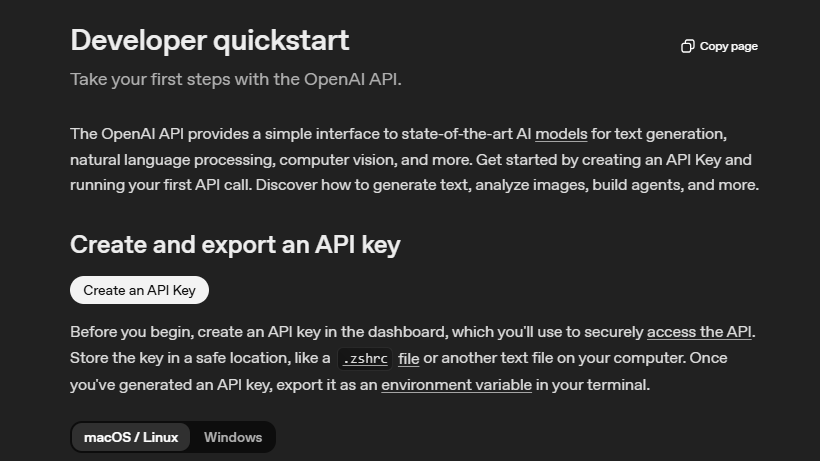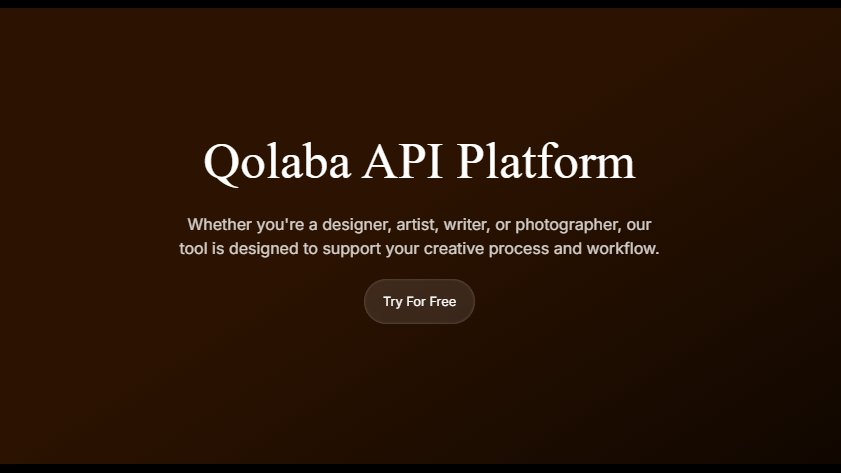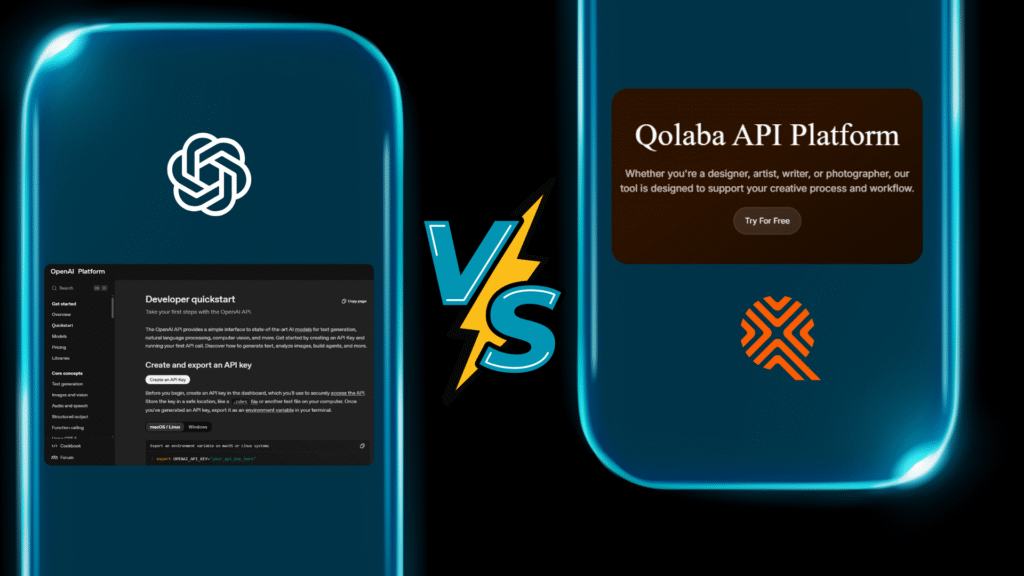As the AI landscape evolves, choosing the right API for integrating advanced intelligence into your product is more critical than ever. OpenAI’s API is an industry standard—powerful yet proprietary. Qolaba API, meanwhile, is gaining recognition for its model-agnostic approach and seamless multi-provider flexibility. How do these two compare when it comes to developer experience, integration range, and team needs?
The decision between these platforms impacts not just your immediate development goals, but your long-term strategic positioning in an increasingly competitive AI-driven market. Organizations today face the challenge of building robust AI capabilities while maintaining flexibility to adapt as technology advances.
Core Integration Features
OpenAI API
- Model Access: Direct integration with frontier models including o1, GPT-4o, GPT-5 family, DALL-E, and Whisper for comprehensive text, vision, and voice tasks
- API Endpoints: Well-structured endpoints for chat completions, embeddings, image generation, audio transcription, function calling, and Realtime API for live speech-to-text and SIP calling
- Developer Resources: Comprehensive documentation, code examples, and SDKs in Python, JavaScript, and other popular languages with detailed REST interface and migration guides
- Advanced Features: Agent SDK for sophisticated orchestration and custom agent design, plus innovative real-time communication capabilities
- Enterprise Security: HIPAA/SOC2 compliance, audit logs, SSO integration, mTLS encryption, and private cloud deployment options
- Usage Management: Organizational-level tracking with granular billing controls, quota management, and comprehensive monitoring tools
- Pricing Model: Pay-as-you-go structure with automatic model upgrades and deprecation notifications for service continuity
- Ecosystem Limitation: All integrations confined to OpenAI’s proprietary ecosystem and business decisions
Qolaba API
- Model-Agnostic Design: Unified interface connecting to 60+ models from OpenAI, Google Gemini, Anthropic Claude, Cohere, Mistral, HuggingFace, and more
- Multi-Modal Support: Seamless integration across text, vision, speech, and custom tool capabilities from multiple providers
- No-Code Builder: Visual API builder and low-code tools enabling rapid prototyping and serverless deployment for non-developers
- Provider Flexibility: Switch, combine, or A/B test multiple AI providers with minimal code changes, eliminating vendor lock-in risks
- Workflow Orchestration: Chain multiple models in single workflows (e.g., Whisper transcription → Claude summarization → Gemini translation)
- Smart Billing: Credit-based system aligning costs with actual usage, independent of individual model providers
- Team Collaboration: Granular access controls, shared workflows, audit logging, and role-based permissions across all connected models
- Advanced Integrations: Data connectors, webhooks, plug-and-play front-end widgets, and comprehensive multi-modal agent creation
- Modern Security: Robust authentication, rate limiting, usage monitoring, and enterprise-grade access controls
- Strategic Protection: Complete vendor independence allowing instant response to pricing, policy, or availability changes
Developer and Team Experience

Learning Curve and Onboarding
OpenAI’s API benefits from extensive community resources, tutorials, and a mature ecosystem that makes onboarding straightforward for developers familiar with REST APIs. The consistent interface across OpenAI models reduces complexity when working within their ecosystem.
Qolaba’s approach requires understanding its abstraction layer initially, but this investment pays dividends when teams need to integrate multiple providers or switch models based on performance, cost, or availability considerations. The visual API builder significantly reduces technical barriers for non-technical team members.
Collaboration and Team Management
OpenAI provides organizational controls and SSO integration suitable for enterprise teams committed to their platform. However, collaboration features remain relatively basic compared to dedicated team-oriented platforms.
Qolaba excels in team collaboration with granular access controls, shared workflows, comprehensive audit logging, and user role management across all connected AI providers. Teams can collaborate on complex multi-model projects with clear visibility into usage, costs, and performance across different AI services.
Development Speed and Iteration
OpenAI’s mature tooling and extensive documentation enable rapid development when building applications within their model family. However, switching to alternative models requires significant refactoring.
Qolaba’s unified interface dramatically accelerates experimentation and iteration. Teams can test different models for specific use cases, implement fallback strategies, and optimize performance without architectural changes.
Flexibility & Future-Proofing

Vendor Lock-in Considerations
OpenAI’s rich developer ecosystem and market dominance provide stability and reliability, but all integrations must run through OpenAI infrastructure. This creates dependency risks if OpenAI changes pricing, policies, or model availability. Organizations commit their entire AI strategy to a single provider’s roadmap and business decisions.
Qolaba’s abstraction layer offers strategic protection against vendor dependency. Teams can respond instantly to pricing shifts, regulatory changes, or model advances by switching providers without major product rewrites. This flexibility becomes increasingly valuable as the AI landscape continues evolving rapidly.
Scalability and Performance
Both platforms handle enterprise-scale workloads effectively, but with different approaches. OpenAI optimizes for performance within their ecosystem, offering predictable latency and throughput for their models.
Qolaba enables intelligent load balancing across multiple providers, potentially offering better reliability and cost optimization through strategic model selection based on real-time availability and performance metrics.
Feature Comparison
OpenAI API

- Direct access to OpenAI’s complete model suite (o1, GPT-4o, DALL-E, Whisper)
- Comprehensive REST API with extensive SDK support
- Agent SDK for custom orchestration and workflow design
- Realtime API for live speech and communication features
- Enterprise-grade security with HIPAA/SOC2 compliance
- Pay-as-you-go pricing with automatic model upgrades
- Extensive community resources and documentation
- Limited to OpenAI’s ecosystem and roadmap
Qolaba API

- Access to 60+ models across multiple providers (OpenAI, Google, Anthropic, Cohere, Mistral)
- Model-agnostic unified interface for seamless switching
- No-code/low-code visual API builder for rapid development
- Multi-model workflow chaining and orchestration
- Credit-based billing system with provider-agnostic costs
- Advanced team collaboration and role-based access controls
- A/B testing capabilities across different AI providers
- Comprehensive data connectors and webhook integrations
- Complete vendor lock-in protection and flexibility
Final Thoughts
Both APIs empower organizations to integrate world-class AI capabilities, but serve different strategic objectives. OpenAI’s API excels for teams seeking deeply optimized performance within a proven, high-performing stack backed by industry-leading models and comprehensive documentation.
Qolaba’s API serves organizations prioritizing maximum flexibility, resilience, and access to the best models from all providers. The platform’s model-agnostic approach, combined with superior team collaboration features and cost optimization capabilities, delivers clear strategic advantages for future-proofing AI workflows.The choice ultimately depends on your organization’s risk tolerance, development resources, and strategic AI vision. If avoiding vendor dependency while maintaining access to cutting-edge AI capabilities aligns with your goals, Qolaba API offers compelling advantages for long-term success.





